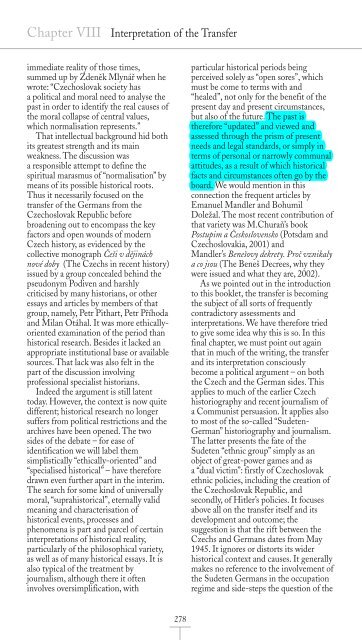the nationality of all inhabitants of the czech provinces and ...
the nationality of all inhabitants of the czech provinces and ...
the nationality of all inhabitants of the czech provinces and ...
Create successful ePaper yourself
Turn your PDF publications into a flip-book with our unique Google optimized e-Paper software.
Chapter VIII Interpretation <strong>of</strong> <strong>the</strong> Transfer<br />
immediate reality <strong>of</strong> those times,<br />
summed up by Zdeněk Mlynář when he<br />
wrote: “Czechoslovak society has<br />
a political <strong>and</strong> moral need to analyse <strong>the</strong><br />
past in order to identify <strong>the</strong> real causes <strong>of</strong><br />
<strong>the</strong> moral collapse <strong>of</strong> central values,<br />
which normalisation represents.”<br />
That intellectual background hid both<br />
its greatest strength <strong>and</strong> its main<br />
weakness. The discussion was<br />
a responsible attempt to define <strong>the</strong><br />
spiritual marasmus <strong>of</strong> “normalisation” by<br />
means <strong>of</strong> its possible historical roots.<br />
Thus it necessarily focused on <strong>the</strong><br />
transfer <strong>of</strong> <strong>the</strong> Germans from <strong>the</strong><br />
Czechoslovak Republic before<br />
broadening out to encompass <strong>the</strong> key<br />
factors <strong>and</strong> open wounds <strong>of</strong> modern<br />
Czech history, as evidenced by <strong>the</strong><br />
collective monograph Češi v dějinách<br />
nové doby (The Czechs in recent history)<br />
issued by a group concealed behind <strong>the</strong><br />
pseudonym Podiven <strong>and</strong> harshly<br />
criticised by many historians, or o<strong>the</strong>r<br />
essays <strong>and</strong> articles by members <strong>of</strong> that<br />
group, namely, Petr Pithart, Petr Příhoda<br />
<strong>and</strong> Milan Otáhal. It was more ethic<strong>all</strong>yoriented<br />
examination <strong>of</strong> <strong>the</strong> period than<br />
historical research. Besides it lacked an<br />
appropriate institutional base or available<br />
sources. That lack was also felt in <strong>the</strong><br />
part <strong>of</strong> <strong>the</strong> discussion involving<br />
pr<strong>of</strong>essional specialist historians.<br />
Indeed <strong>the</strong> argument is still latent<br />
today. However, <strong>the</strong> context is now quite<br />
different; historical research no longer<br />
suffers from political restrictions <strong>and</strong> <strong>the</strong><br />
archives have been opened. The two<br />
sides <strong>of</strong> <strong>the</strong> debate – for ease <strong>of</strong><br />
identification we will label <strong>the</strong>m<br />
simplistic<strong>all</strong>y “ethic<strong>all</strong>y-oriented” <strong>and</strong><br />
“specialised historical” – have <strong>the</strong>refore<br />
drawn even fur<strong>the</strong>r apart in <strong>the</strong> interim.<br />
The search for some kind <strong>of</strong> univers<strong>all</strong>y<br />
moral, “suprahistorical”, etern<strong>all</strong>y valid<br />
meaning <strong>and</strong> characterisation <strong>of</strong><br />
historical events, processes <strong>and</strong><br />
phenomena is part <strong>and</strong> parcel <strong>of</strong> certain<br />
interpretations <strong>of</strong> historical reality,<br />
particularly <strong>of</strong> <strong>the</strong> philosophical variety,<br />
as well as <strong>of</strong> many historical essays. It is<br />
also typical <strong>of</strong> <strong>the</strong> treatment by<br />
journalism, although <strong>the</strong>re it <strong>of</strong>ten<br />
involves oversimplification, with<br />
278<br />
particular historical periods being<br />
perceived solely as “open sores”, which<br />
must be come to terms with <strong>and</strong><br />
“healed”, not only for <strong>the</strong> benefit <strong>of</strong> <strong>the</strong><br />
present day <strong>and</strong> present circumstances,<br />
but also <strong>of</strong> <strong>the</strong> future. The past is<br />
<strong>the</strong>refore “updated” <strong>and</strong> viewed <strong>and</strong><br />
assessed through <strong>the</strong> prism <strong>of</strong> present<br />
needs <strong>and</strong> legal st<strong>and</strong>ards, or simply in<br />
terms <strong>of</strong> personal or narrowly communal<br />
attitudes, as a result <strong>of</strong> which historical<br />
facts <strong>and</strong> circumstances <strong>of</strong>ten go by <strong>the</strong><br />
board. We would mention in this<br />
connection <strong>the</strong> frequent articles by<br />
Emanuel M<strong>and</strong>ler <strong>and</strong> Bohumil<br />
Doležal. The most recent contribution <strong>of</strong><br />
that variety was M.Churaň’s book<br />
Postupim a Československo (Potsdam <strong>and</strong><br />
Czechoslovakia, 2001) <strong>and</strong><br />
M<strong>and</strong>ler’s Benešovy dekrety. Proč vznikaly<br />
a co jsou (The Beneš Decrees, why <strong>the</strong>y<br />
were issued <strong>and</strong> what <strong>the</strong>y are, 2002).<br />
As we pointed out in <strong>the</strong> introduction<br />
to this booklet, <strong>the</strong> transfer is becoming<br />
<strong>the</strong> subject <strong>of</strong> <strong>all</strong> sorts <strong>of</strong> frequently<br />
contradictory assessments <strong>and</strong><br />
interpretations. We have <strong>the</strong>refore tried<br />
to give some idea why this is so. In this<br />
final chapter, we must point out again<br />
that in much <strong>of</strong> <strong>the</strong> writing, <strong>the</strong> transfer<br />
<strong>and</strong> its interpretation consciously<br />
become a political argument – on both<br />
<strong>the</strong> Czech <strong>and</strong> <strong>the</strong> German sides. This<br />
applies to much <strong>of</strong> <strong>the</strong> earlier Czech<br />
historiography <strong>and</strong> recent journalism <strong>of</strong><br />
a Communist persuasion. It applies also<br />
to most <strong>of</strong> <strong>the</strong> so-c<strong>all</strong>ed “Sudeten-<br />
German” historiography <strong>and</strong> journalism.<br />
The latter presents <strong>the</strong> fate <strong>of</strong> <strong>the</strong><br />
Sudeten “ethnic group” simply as an<br />
object <strong>of</strong> great-power games <strong>and</strong> as<br />
a “dual victim”: firstly <strong>of</strong> Czechoslovak<br />
ethnic policies, including <strong>the</strong> creation <strong>of</strong><br />
<strong>the</strong> Czechoslovak Republic, <strong>and</strong><br />
secondly, <strong>of</strong> Hitler’s policies. It focuses<br />
above <strong>all</strong> on <strong>the</strong> transfer itself <strong>and</strong> its<br />
development <strong>and</strong> outcome; <strong>the</strong><br />
suggestion is that <strong>the</strong> rift between <strong>the</strong><br />
Czechs <strong>and</strong> Germans dates from May<br />
1945. It ignores or distorts its wider<br />
historical context <strong>and</strong> causes. It gener<strong>all</strong>y<br />
makes no reference to <strong>the</strong> involvement <strong>of</strong><br />
<strong>the</strong> Sudeten Germans in <strong>the</strong> occupation<br />
regime <strong>and</strong> side-steps <strong>the</strong> question <strong>of</strong> <strong>the</strong>


